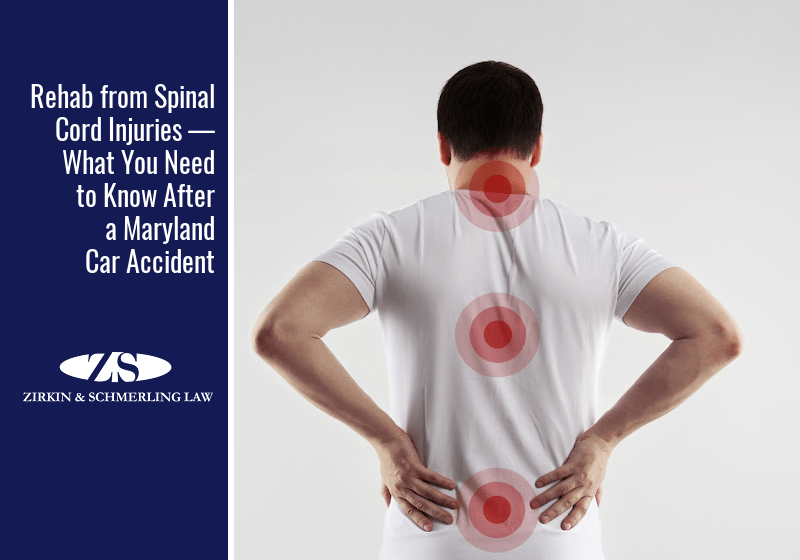
Numerous people suffer from spinal cord injuries after experiencing a car accident. There are 17,000 new cases of spinal cord injuries every year, and many of those new cases result from car accidents.
Spinal cord injuries can result in mobility issues and even paralysis. If you’re experiencing symptoms of a spinal cord injury after a car accident, you need to check with medical professionals to properly diagnose the issue. Spinal cord injuries also come with a heavy financial burden, so you need to work with a spinal cord injury attorney to gain compensation if another driver was at fault.
Causes of Spinal Cord Injuries
Damage to the spinal cord occurs when cells of the spine and related parts undergo trauma. Vehicular accidents sometimes result in enough cell damage to the spinal cord to cause serious negative effects. Those who have suffered from a spinal cord injury need a period of medical recovery, but even with rehabilitation, not every person can fully recover after experiencing spinal cord damage.
Spinal Cord Compression
An incredibly common spinal cord injury that occurs after a car accident is compression. When a person experiences blunt force trauma from a vehicular accident, the spinal cord columns can become compressed. Compression can result in bruising and contusions across the spinal cord.
Complete and Incomplete Spinal Cord Injuries
The two main categories of spinal cord injuries are complete and incomplete. A complete spinal cord injury occurs when the spinal cord is entirely compressed or severed, which then results in the brain being unable to send signals to the body below the injury.
Incomplete injuries occur when the spinal cord receives damage but the brain is still able to send signals below where the injury occurred. 65% of spinal cord injuries are incomplete. The different types of incomplete spinal cord injuries include:
- Anterior Cord Syndrome: Occurs with an injury to the front of the spinal cord and results in issues related to motor skills and sense of touch.
- Cauda Equina Syndrome: Occurs when the nerves of the spinal cord become compressed. This syndrome often primarily affects the side of the body in which the spine was damaged.
- Brown-Sequard Syndrome: Occurs when the spinal cord experiences lesions, which results in issues with motor skills and sensory functions near the spot that was injured.
- Posterior Cord Syndrome: Occurs with damage to the rear part of the spinal cord, which results in coordination issues.
- Conus Medullaris Syndrome: Occurs when the sacral cord and nerves experience trauma. This often affects lower limb reflexes and the excretory system.
Central Cord Syndrome
In addition to the previously mentioned incomplete spinal cord injuries, there’s also central cord syndrome, which involves damage to the corticospinal tracts located in the cervical region of the spine. The cervical region is made up of seven vertebrae located in the neck. Central cord syndrome can result in lacerations or tears on the spinal column. This injury can result in weakness in the arms and legs because of nerve damage.
Signs of a Spinal Cord Injury after experiencing a Car Accident
According to the Mayo Clinic, major indicators of a serious spinal injury after a vehicular accident include:
- Back pain or pressure in the head, back, or neck
- Incoordination, weakness, or paralysis in part of the body
- Tingling or numbness in the hands, feet, toes, and fingers
- Inability to control bladder or bowel movements
- Lack of coordination resulting in difficulty walking and balancing
- Impaired breathing
- Twisted neck or back
Additionally, they list two types of paralysis that can occur with a spinal cord injury:
- Tetraplegia: Also known as quadriplegia, this means that the arms, hands, legs, trunk, and pelvic organs are impacted by the spinal cord injury.
- Paraplegia: This affects the trunk, legs, and pelvic organs.
Spinal Cord Rehabilitation
Spinal cord injuries are incredibly complex and the duration of rehabilitation treatment differs for each person. Treatment will depend on the specific spinal injury and will also depend on bodily limitations and the patient’s needs. When you seek treatment for a spinal cord injury, you’ll often meet with a team of professionals who diagnose the issue and create a custom rehabilitation plan. Individuals may be unable to recover entirely from a spinal cord injury, but rehabilitation can:
- Improve your mobility and strength
- Help you use technology to increase your functionality
- Assist you in coping emotionally and psychologically after experiencing the injury
Again, spinal cord rehabilitation depends on each individual, but you can expect to see improvements to your condition even if you can’t fully recover from the injury.
Zirkin & Schmerling Law: Have a Team at Your Side
If you or a loved one have experienced a car accident resulting in spinal cord damage, contact Zirkin and Schmerling to explore your options for compensation. We’re here to support Maryland residents and offer legal guidance for those who’ve experienced vehicular accidents. Our team has been able to get clients millions of dollars in compensation, so call us today at 410-356-4455 or contact us here.
